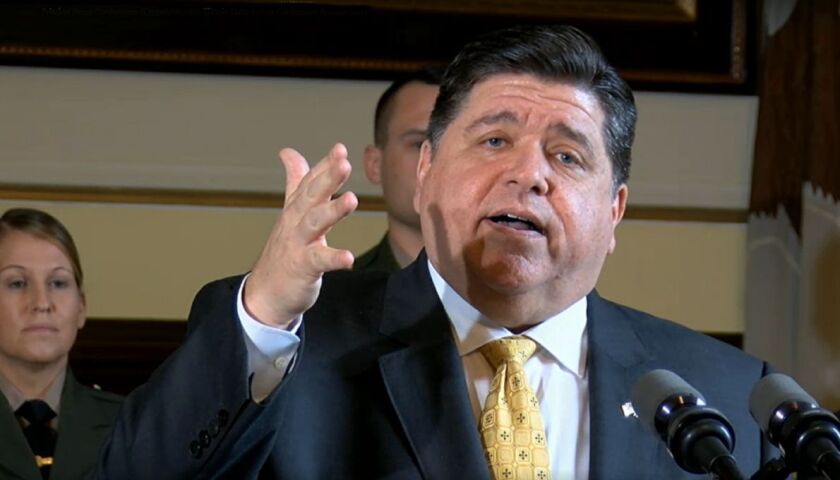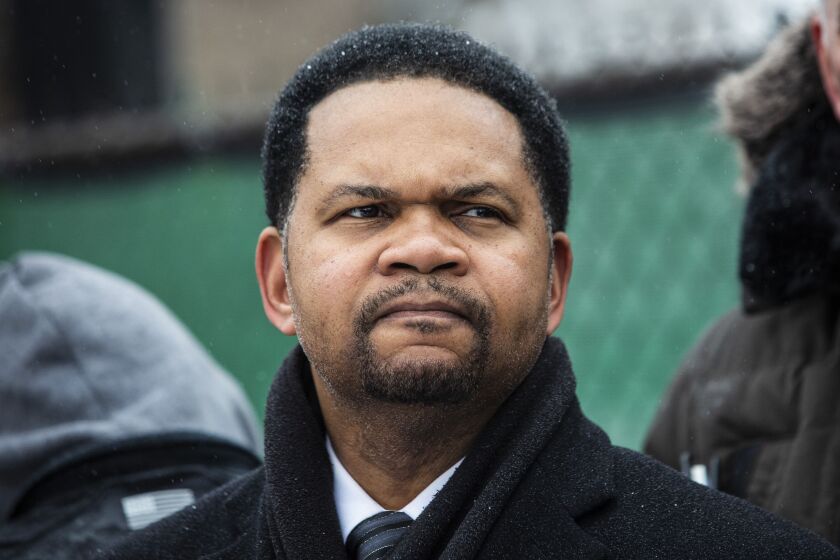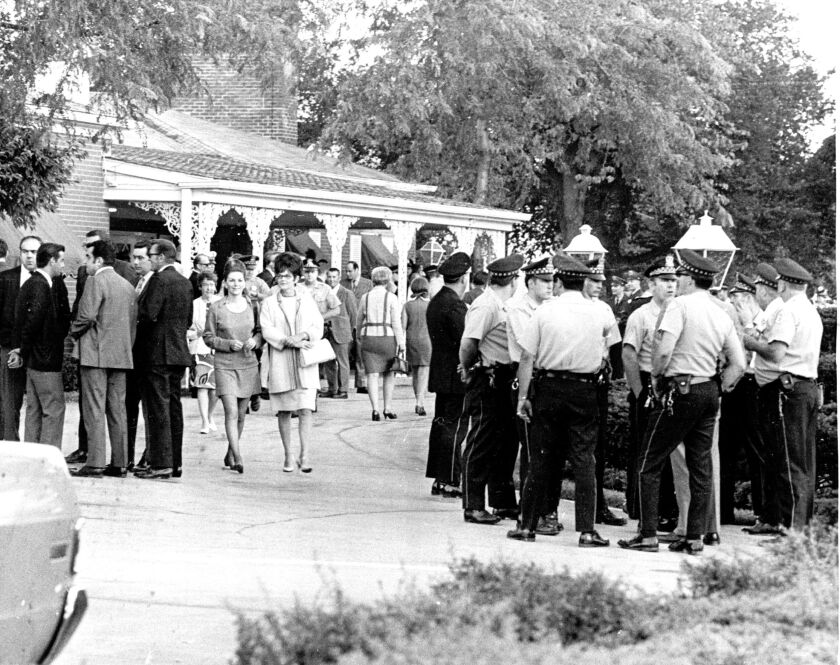Pritzker compares GOP to QAnon after Senate rejects parole board appointees
A day after losing his battle to keep two of his appointees on the Illinois Prisoner Review Board, Gov. J.B. Pritzker on Tuesday delivered an impassioned defense of the “incredibly thankless job” they do and a blistering attack on their Republican critics — comparing them to QAnon conspiracy theorists.
Just as local Republicans are following the soft-on-crime strategy being used against Democrats nationally, Pritzker is taking a page from the Democratic playbook, dismissing dissenting Republicans as a bunch of wild-eyed disciples of former President Donald Trump.
The governor lodged his new attack on the GOP at an unrelated event on Tuesday, as he defended his appointees from the criticism they faced the day before.
“Now, to have Republicans attack them and their character and their biographies, to have Republicans essentially trying to tear apart this agency of government — I mean this is what the GQP has been all about, tearing government apart,” Pritzker said at a Springfield news conference where he commemorated the 100th anniversary of the creation of the Illinois State Police.
The Democratic governor pronounced the GQP acronym slowly and carefully in response to a reporter’s question about the Senate vote the day before. His staff said they haven’t heard him utter the acronym before. But it’s been used by some Democrats nationally to label Republicans as the “Grand QAnon Party,” more interested in dismantling government and chasing dark conspiracy theories than governing.
But Pritzker doesn’t just have Republicans to blame for this week’s defeat during what has already become a heated election year.
There were 14 Senate Democrats who didn’t support Eleanor Wilson, Pritzker’s appointee to the parole board, Monday evening, and 12 other Democrats who refused to vote at all. Pritzker’s other appointee, Oreal James, had resigned from his post earlier Monday to avoid what many expected to be a similar rejection.
When it comes to his appointees and their parole decisions, Pritzker said Republicans are hyper focusing on the headlines of the original crime and ignoring everything else, “including what the victims’ statements have been, including the victims’ families’ statements, including other information that may have come forward in the subsequent decades in order to make their decision.”
The governor offered no opinion on the Democrats who declined to support his appointees.

Gov. J.B. Pritzker speaks at a news conference at the state Capitol on Tuesday.
Blue Room Stream
But Pritzker credited Democratic and Republican board members for working together to review all the facts of the cases to make tough decisions.
“I will just say it’s an incredibly thankless job,” Pritzker said.
“It’s hard to second guess the work that they do. It’s very easy just to say this person committed an awful crime some many years ago and to say, ‘We’re going to throw away the key and leave them all in prison,’” Pritzker said. “That’s what you’re going to end up with. If that’s what people want, well, let’s hear it then. But I don’t think that’s what people wanted when we created the Prisoner Review Board.”
Responding to Pritzker’s remarks, Republican challenger Richard Irvin’s campaign released an email blaming the Democrat for the deterioration of public safety in the state and criticizing the governor’s mention of victims’ families.
The GOP gubernatorial candidate’s campaign said the Prisoner Review Board had granted parole to three killers — Joseph Hurst, Johnny Veal and James Taylor — despite families of the police officers they killed attending parole hearings or writing letters to oppose their release from prison.

Aurora Mayor Richard Irvin in 2019.
Ashlee Rezin/Sun-Times file
Veal, 69, was convicted of killing Chicago Police Sgt. James Severin and Officer Anthony Rizzato in 1970. Hurst, 78, was convicted of killing Chicago police Officer Herman Stallworth in 1967. Taylor helped hold down Illinois State Trooper Layton Davis while another man shot him in 1976. All three men were released from prison but must report to parole officers for the duration of their original sentences.
The Illinois Prisoner Review Board voted 8-4 to parole both Veal and Hurst. The board voted 8-5 to release Taylor.
Pritzker’s two appointees — Wilson and James — have drawn public criticism from lawmakers for their votes to free Veal and Hurst.

Mourners line the drive outside a North Side funeral home in 1970 for visitation the day before the funeral mass for slain Chicago Police Officer Anthony Rizzato.
Sun-Times archives
The governor’s office said the process to find appointees is “ongoing,” but argued it’s not easy to find people willing to take the full-time positions when their decisions are being studied under a microscope. Staffers have been combing through appointees’ applications for weeks, they said. Still, there are now just six members of the 15-seat board, which requires eight for a quorum.
But the abbreviated legislative session ends April 8, and it’s unclear whether Pritzker will be able to both find the right candidates for the vacant seats and get them confirmed by the Senate in time. The governor can still appoint people to the positions and grant them temporary powers that come with the post, with confirmation hearings to come in the fall. But in an election year, that could start a new feud and perhaps a GOP call for a special session to hold hearings on the appointees.
Meanwhile, a scheduled “en banc” hearing, in which the board would have voted on those seeking parole, has been postponed until the board can find a quorum. That’s not lost on advocacy groups for prisoners, including the Illinois Prison Project, whose director Jennifer Soble called the attacks on the board members “the result of failed tough-on-crime rhetoric meant merely to incite fear and score cheap political points.”
Illinois Republicans running for offices up and down the ballot have attacked Democrats for what the GOP characterizes as failed crime-fighting strategies. Irvin and rival Republican gubernatorial candidate Jesse Sullivan released new TV commercials touching on the issue on Tuesday.
On the other side, Pritzker has been lining up with national Democrats in linking rivals to Trump and the far right. The governor’s use of the GQP line is a first for him, but Pritzker has already sought to paint his rivals as followers of Trump who buy into false conspiracy theories about the 2020 election.
“Some of these folks who are running on the Republican side — maybe all of them, I’m not sure — don’t accept the results of the 2020 elections,” Pritzker told a small group of supporters last month. “[They] question whether elections are fair in Illinois, and they can’t even call out the former President Trump when he says crazy things about our country.”


